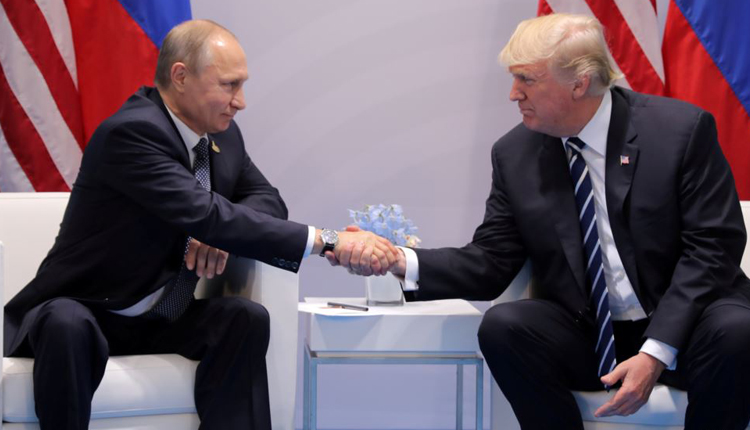A bipartisan group of U.S. senators introduced a bill on Wednesday that would impose stiff new sanctions on Russia over its meddling in U.S. elections and aggression against Ukraine, the latest congressional effort to push President Donald Trump to ratchet up Washington’s response to Moscow.
It was introduced by Republican Senator Lindsey Graham and Democratic Senator Bob Menendez, as well as other members of the Senate Foreign Relations Committee. It is a tougher version of legislation – dubbed the “sanctions bill from hell” by Graham – the two lawmakers backed last year but which failed to pass.
The new bill, which was first reported by Reuters, may have a better chance of passing Congress now, either as a whole or as amendments to other legislation, in the face of growing bipartisan anger over Russia’s interference in other countries’ affairs.
Trump, who has gone along with some previous congressional efforts to increase sanctions on Russia, though sometimes reluctantly, would have to sign the bill before it became law.
“President Trump’s willful paralysis in the face of Kremlin aggression has reached a boiling point in Congress,” Menendez, the top Democrat on the Senate Foreign Relations Committee, said in a statement.
The White House did not immediately respond to a request for comment on the bill.
Targets of the sanctions would include: Russian banks that support efforts to interfere in foreign elections; the country’s cyber sector; new sovereign debt; and individuals deemed to “facilitate illicit and corrupt activities, directly or indirectly, on behalf of (Russian President Vladimir) Putin.”
The bill also would impose several strict measures on Russia’s oil and gas sector, which makes up about 40 percent of the Russian government’s revenues, including sanctioning people who provide goods, services or financing to support the development of crude oil in the country. Russian state-owned energy projects outside of Russia including investments in liquefied natural gas projects also would face sanctions.
Global energy companies including BP, Shell and ENI are likely to oppose the bill as are U.S.-based companies including Exxon Mobil Corp and Chevron Corp . BP owns nearly 20 percent in Rosneft, Russia’s largest oil producer.
Brian O’Toole, who worked on sanctions at the U.S. Treasury under former President Barack Obama, said the bill is a salvo in Congress’ negotiations with the Trump administration over Russia, although some provisions, particularly on energy, must be watered down to get enough support to pass.
“But I think there is an appetite to be angry with Russia right now, not just from the Democratic side,” O’Toole said.
CONFRONTING TRUMP
Members of Congress, including many of Trump’s fellow Republicans, have pushed the president to act more forcefully against Moscow during his presidency, which has been shadowed by Russia-related probes.
U.S. Special Counsel Robert Mueller is investigating Russian meddling in the 2016 U.S. election and Moscow’s possible collusion with the Trump campaign. Russia has denied interfering in the election and Trump has called the probe a witch hunt.
The Senate, where Republicans have a slim majority, narrowly failed last month to pass a resolution disapproving of Trump’s easing of sanctions on Russian companies tied to Russian oligarch Oleg Deripaska. Supporters of the effort vowed to try again.
Menendez said Congress wanted action to respond to the humanitarian disaster in Syria, where Russia backs President Bashar al-Assad, Moscow’s aggression in Ukraine, “and the steady erosion of international norms.”
“One thing is increasingly clear: Moscow will continue to push until it meets genuine resistance,” Menendez said.
Graham, a leading Republican congressional foreign policy voice and Trump ally, said he was determined to send a strong message to Moscow.
“Our goal is to change the status quo and impose meaningful sanctions and measures against Putin’s Russia,” Graham said in a statement. “He should cease and desist meddling in the U.S. electoral process, halt cyberattacks on American infrastructure, remove Russia from Ukraine, and stop efforts to create chaos in Syria.”
The bill, the “Defending American Security from Kremlin Aggression Act,” known as DASKA, would create U.S. policy offices on cyber defenses and sanctions coordination. It would also require a report on Putin’s net worth and assets.
It includes strong support for NATO, including requiring a two-thirds majority in the Senate in order for the United States to leave the alliance. It includes provisions to make it easier to transfer excess military equipment to NATO countries to reduce their dependences on Russian products.
The bill was also introduced by Republican Senator Cory Gardner and Democratic Senators Ben Cardin and Jeanne Shaheen.
Source: Reuters
